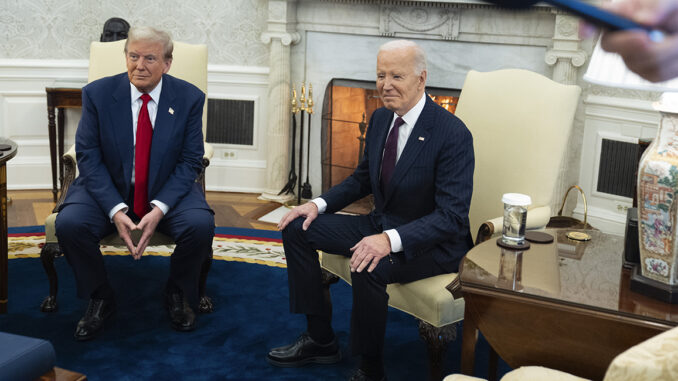
In 2008, Barack Obama rode into Washington on the back of a multiethnic coalition promising hope, change and a post-racial America. He spoke of there being no red America or blue America, just the United States of America. Fifteen years later, Donald Trump delivered on that promise — just not the way anyone in the Democratic Party expected.
That Madison Square Garden rally last month wasn’t hubris after all. It was a victory lap by a candidate who had done something remarkable: built a winning coalition of working-class Americans across every demographic group, while the Democrats morphed into exactly what they once despised — the party of out-of-touch elites telling everyone else how to live.
The role reversal would be comical if it wasn’t so profound. Today’s Democratic Party counts Liz Cheney among its heroes. The same liberals who once hung “war criminal” signs with Dick Cheney’s face now nod along to his daughter’s warnings about democracy. Meanwhile, at MSG, the MAGA faithful erupted in cheers for Tulsi Gabbard and RFK Jr. as they denounced endless wars and celebrated American workers. The political establishment didn’t just change jerseys; they changed entire sports.
But the real story isn’t in the musical chairs of political elites. It’s in places like Miami-Dade County and the Rio Grande Valley, where working-class Hispanic voters rejected the identity politics of the Democratic Party in favor of Trump’s economic populism. It’s in urban precincts where black voters, tired of decades of unfulfilled promises, decided that maybe the guy with the gold-plated toilet actually understood their concerns better than a former prosecutor running on checking diversity boxes.
The Democratic Party’s fatal mistake was assuming their coalition was permanent — that working-class minority voters would stay loyal while they chased the votes of suburban wine moms with graduate degrees. They forgot the first rule of politics: Voters care about their wallets first. That a former Manhattan real estate developer with a golden elevator understood this vastly better than the party that once represented union workers and lunch-pail Democrats should be a wake-up call (but it probably won’t be).
In Starr County, Texas — a place so reliably Democratic that the last Republican to win it was fighting in the Spanish-American War — Trump didn’t just win, he won big. Miami-Dade County, the beating heart of Hispanic Democratic power in Florida, swung so hard to Trump that it signaled a MAGA wave hours before calls began in the swing states. These weren’t just changes in voting patterns, they were generational transformations in political identity.
The only demographic group where Kamala Harris improved upon Biden’s 2020 numbers was college-educated women. Everyone else — from working-class Hispanics to black men to Asian small business owners — moved toward Trump’s coalition. The “party of diversity” had become the party of upper-middle-class white professionals who put Black Lives Matter signs in their perfectly manicured yards while fretting about affordable housing developments in their neighborhoods.
The real danger for Democrats isn’t just that they lost in 2024 — it’s that they might be entering a decade or more in the political wilderness. Their platform has been reduced to two planks: “Orange Man Bad” and diversity scorecards that matter more in faculty lounges than in family rooms.
Here’s the thing about most Americans: When the toilet is overflowing, you don’t check their plumber’s diversity credentials. They just need someone who can fix the damn problem. If Trump’s coalition succeeds — if his policies actually deliver for the working-class voters who just gave him a mandate — Democrats will face an even bigger problem: They’ll have opposed everything he proposed and will have nothing left to run on except “we told you he was bad.” It’s the political equivalent of burning your house down to prove your neighbor’s kitchen remodel went wrong.
The irony is almost Shakespearean. Obama promised a post-racial America united by common purpose. Trump went ahead and built it — not through carefully focus-grouped DEI initiatives, but by talking to voters about their bank accounts instead of their skin color or pronouns. The Democrats’ response? Double down on the very identity politics that voters just rejected.
The new American majority wasn’t built on Twitter likes or DEI statements. It was built on Obama’s forgotten promise, one that Donald J. Trump, of all people, remembered and delivered on: In this country, we aren’t white, black, or brown. We’re Americans.
Jordan Golson is a writer and commentator living outside Boston. He pens a car review column for North State Journal and oversees the paper’s local editions.



